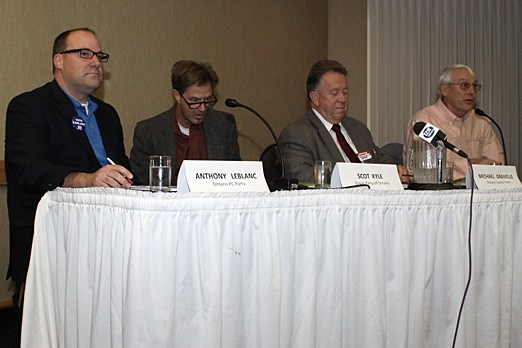Candidates for Thunder Bay-Superior North showed how green their parties were at a public forum on Saturday.
It was the first time Liberal candidate Michael Gravelle, Progressive Conservative candidate Anthony LeBlanc, NDP candidate Steve Mantis and Green candidate Scot Kyle appeared at a public panel together. The 45-minute forum, held at the Victoria Inn, gave the candidates a chance to answer three questions about the environment.
LeBlanc said the first thing his party would do to reduce Ontario’s carbon footprint would be to shut down coal plants by 2014 and look closer at the science involved with renewable sources of energy like wind turbines.
“The reality is there are conflicting stories out there,” LeBlanc said. “While it is important to move the discussion forward and invest in green energy such as wind turbines you also have to realize that it is not 100 per cent solid on it having an inverse effect on climate change.”
Kyle agreed there was conflicting data around climate change but that meant people were discussing the issue. He said his party would make local consultation a higher priority and reward sustainable green business practices.
Gravelle echoed LeBlanc’s comments to shut down coal plants and added his party supported a cap and trade system to try to lower greenhouse emissions by six per cent by 2014 and 15 per cent by 2020.
“I believe northerners support a green environment,” Gravelle said. “There’s no question in context of this discussion that we all support this decision and it opens up the discussion on how one makes the right decisions regarding climate change.”
Mantis said to make change it is important for everyone to work together because there’s a lot of interest in maintaining the carbon-based economy.
“If you count on electing one of us to make the change, I’m sorry you are going to be disappointed,” Mantis said.
The discussion then moved to how the candidates would help natural resource based cities.
Kyle said there’s no shortage of resources but there was a shortage of money within households and people who are struggling to set up businesses.
“(The community forestry model) is going to sound radical to some people but it just seems to make good common sense,” Kyle said. “The community and the actual stakeholders can have an actual stake in the profits and in the management.”
Gravelle said his party has started to transform the forestry industry to produce more biomass products. He added it would be challenging to get the industry back to the way it was but more biomass will create more options for the industry to grow.
But if companies come into communities, Mantis said they have to promise to create sustainable jobs that impact positively on the community and the environment. He also added there needs to be more diversity so a city isn’t completely dependent on a single resource for their economy.
LeBlanc said overall, there needs to be better economic development and more people who understood those types of initiatives in the private sector. He said the wood allocation process was a key reason why so many mills closed and the process has to be fixed.
